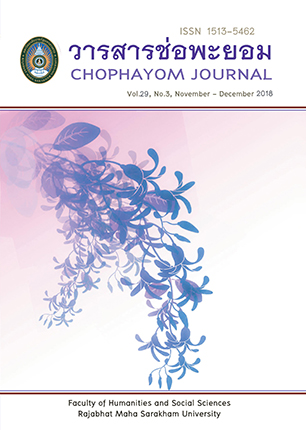A Model of Academic Administration Based on Philosophy of Sufficiency Economy for Primary Schools under the Office of Loei Primary Educational Service Area
Keywords:
Model for Academic Administration, Philosophy of Sufficiency Economy, Loei Primary Educational Service AreaAbstract
The objectives of the research were to study the conditions of academic administration based on the Philosophy of Sufficiency Economy in primary schools under Loei Primary Educational Service Area Office, to develop a model of academic administration based on the Philosophy of Sufficiency Economy for primary schools under Loei Primary Educational Service Area Office, and to evaluate the model for academic administration based on the Philosophy of Sufficiency Economy. The model was implemented with three hundred and eighty participants consisting of school administrators, supervisors, teachers and educational personnel of elementary schools under Loei Primary Educational Service Area Office. The research instrument was a questionnaire and an in-depth interview form. The statistics used for data analysis were the percentage, mean and standard deviation. The research results showed that the overall condition of the academic administration based on the Philosophy of Sufficiency Economy in primary schools under Loei Educational Service Area Office was at a high level. However, the Philosophy of Sufficiency Economy was used variously for academic administration because of the unclear practical guidelines. As a result, a model of academic administration based on the Philosophy of Sufficiency Economy was designed and developed for primary schools under Loei Educational Service Area Office. The model for academic administration in primary schools consisted of seven activities. Finally, the findings indicated that the model was practical and useful for primary schools at a high level.
References
Khonkaen Primary Education Service Area Office 1. (2009). Workshop on Teaching and Learning in Sufficiency Economy Philosophy. (Online). https://www.kkzone1.go.th [Accessed 3 November 2017].
Ministry of Education. (2007). Education reform guidelines of the Ministry of Education. Bangkok. TSB Products.
Ministry of Education. (2008). Core Curriculum Basic Education 2008. Bangkok. Agriculture Cooperatives of Thailand Printing
Ministry of Education. (2009). Guide to Evaluating Educational Institutions, Teaching and Management Patterns The philosophy of sufficiency economy. Fiscal year 2009. Bangkok.
Ministry of Education. (2012). Guidelines for Educational Reform of the Ministry of Education. Bangkok.
Pradinan Uporamai. (2008). Emp Ower the Team with Sufficient Economy PHI. Nonthaburi : National Print Technology Training Center, Sukhothai Thammathirat Open University.
Preeyaporn Wonganutrohd. (2010). Academic Administration. Bangkok : Bangkok Communication Center. PIMDEE Publishing.
Small and Medium Enterprises Development Institute. (2003). Access to the meaning of the organization. Bangkok.
Sirichai Kanjanawasee. (2007). Evaluation theory. Edition 5th. Bangkok. Chulalongkorn University.
Surin Phusing. (2009). Development of Educational Management Model by Integration of Sufficiency Economy Philosophy in Secondary Schools, Office of Ubon Ratchathani Educational Service Area. Doctor of Education, Educational Administration and Development, Mahasarakrm university.






